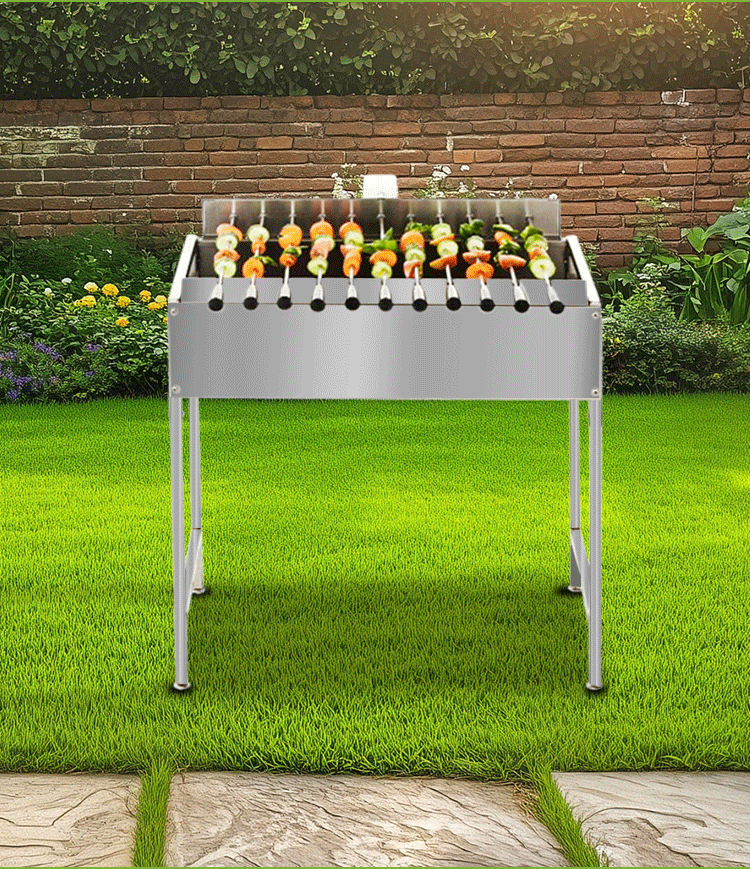Understanding Your Grill Type and Cooking Needs
Differences Between Gas, Charcoal, and Pellet Grills
Picking out the right kind of grill really matters if someone wants to enjoy their outdoor cooking adventures since different models come with their own perks. Gas grills work great when people need something fast with good temperature control. Most folks find them super easy to handle too, which makes them a top choice for newbies or anyone short on time trying to get dinner ready quickly. Charcoal grills have this special place in the hearts of many barbecue lovers because they give food that amazing smoky taste nobody else can match. Sure, learning how to manage charcoal takes some practice, but once mastered, the rich flavors totally justify all the extra work involved. Pellet grills stand out as versatile tools that bring together what's best about both gas and charcoal units. With these bad boys, cooks can do everything from searing steaks directly over heat to slow smoking ribs overnight. For anyone looking to expand their culinary possibilities while grilling outside, pellet grills open up a whole world of techniques right there in the backyard.
Matching Accessories to Your Grilling Frequency
Getting the right grilling gear for how often we actually fire up the grill really makes a difference in our overall experience. Casual folks who only grab the BBQ a handful of times each year usually find that simple stuff works just fine. A good spatula, sturdy tongs, maybe even those handy disposable mats when dealing with sticky foods cover most needs without breaking the bank. The key here is getting what gets the job done without spending too much cash upfront. Regular grill enthusiasts though? They know they need better equipment for serious cooking sessions. Think digital thermometers that give precise readings, heavy duty brushes that last through multiple seasons, and gloves that can handle extreme heat without melting down. These upgrades make grilling safer and way more enjoyable over time. And honestly, matching accessories to personal preferences matters a lot too. Someone who loves smoking meats will want different tools than someone focused on quick sears. When our gear fits our habits and styles, everything runs smoother and the food tastes better because of it.
Considering Space and Storage Limitations
Space is probably the biggest challenge when setting up a grill area, especially if backyard real estate is tight. Most folks forget to actually measure what they have before buying equipment. Compact grills work wonders for small spaces, and many models come with foldable parts that save room when not in use. Some manufacturers make really clever designs that combine cooking surfaces with storage compartments underneath. Portable carts with wheels are another great option for folks who need flexibility. Don't overlook creative storage hacks either - some people attach shelves under deck railings or use wall-mounted racks for utensils and propane tanks. With a bit of smart organization, even tiny patios can become functional grilling stations without feeling cluttered or unsafe.
Essential BBQ Accessories for Basic Grilling
Heat-Resistant Gloves and Grilling Utensils
Safety comes first when firing up the grill, so getting a good pair of heat resistant gloves makes sense. They keep fingers safe from those inevitable burns when grabbing hot food or moving around the grill itself. Most quality gloves can handle pretty intense heat without melting down, making the whole grilling process much safer and smoother. Don't forget about the right tools either. Good grilling utensils are almost as important as the gloves. Look for long handled tongs that let you flip steaks without burning yourself, spatulas big enough for burgers and fish fillets, plus maybe a brush for applying sauce. Tools with ergonomic handles make all the difference after hours on the grill. Nobody wants sore hands ruining what should be a fun cookout. The right equipment just makes everything better in the end.
Meat Thermometers for Precision Cooking
Getting the right temperature when cooking meat makes all the difference between safe food and something that just tastes bad. Thermometers help avoid those situations where meat comes out either raw in the middle or dried out on the outside. There are several kinds available these days including digital models that beep when done, old school dial ones that need patience to read, and instant read versions that give results almost immediately. Digital ones tend to be best for grilling because they show numbers fast enough before the meat gets ruined. Keep checking calibration every now and then by putting it in ice water or boiling water. Also important to wipe down the probe after using it so bacteria doesn't hang around. Good maintenance means better results at the grill, nobody wants to eat undercooked chicken or waste expensive steak that was cooked wrong.
Grill Brushes and Cleaning Tools
Keeping the grilling area clean matters a lot when it comes to getting good flavors and staying safe from germs, which makes having proper cleaning gear absolutely necessary. The standard brush does a decent job at clearing away those bits of burnt stuff stuck to the grates, but sometimes we need more than just a brush. Scrapers come in handy for really tough spots, and sponges handle regular maintenance pretty well too. Different situations call for different tools basically. Some folks swear by certain brands or types over others based on what works best for their specific grill setup. Clean grills lead to better tasting food overall because there's less chance of cross contamination between meals. Getting the right set of cleaning supplies means our grills stay in great shape no matter how many times we fire them up throughout summer.
Advanced Tools for Enhanced Grilling Experiences
Smoking Boxes and Wood Chips for Flavor
Smoke boxes and wood chips really change up what people can do when they grill, bringing all sorts of new flavors into BBQ dishes. When someone uses a smoke box, meats and veggies get that rich smoky taste without being too close to the hot flames. The different woods matter a lot too. Cedar gives something light and sweet while hickory packs quite a punch with its strong, almost bacon-like flavor. Apple wood? That brings a nice fruity note that works great on pork or chicken. Before putting them on the fire, most folks find soaking the wood chips in water first makes them smolder better instead of just burning up quickly. And timing matters big time here. If the chips go in too early, the smoke disappears before anything actually absorbs it. Wait until the meat is already cooking nicely and then add those chips for best results.
Rotisserie Attachments and Grill Baskets
Adding a rotisserie attachment to a grill really transforms how people cook roasted meats at home. The way these attachments spin continuously helps meat cook evenly all around, which means juicy chicken breasts, tender pork loins, maybe even some beef cuts turn out great most of the time. For things that don't fit on a standard rotisserie skewer, grill baskets come in handy. They hold veggies securely so they won't slip through the gaps in the grate while cooking. When looking for either type of accessory, it makes sense to check what kind of grill space is available and think about what kinds of food will be prepared most often. Getting the correct attachments expands what's possible on the barbecue and generally makes backyard cooking sessions more enjoyable for everyone involved.
Grill Lights and Temperature Controllers
Grill lights really make a difference when cooking at night because they let people see what they're doing without straining their eyes or risking accidents on dark patios. When combined with good temperature controllers, these lighting systems help manage heat much better, which matters a lot during tricky grilling tasks such as smoking brisket or slow roasting chicken. The best controllers keep things steady so food doesn't get overcooked or underdone. Anyone serious about getting reliable results should look into models that other grillers have actually tested out themselves rather than just reading specs online. Most experienced cooks will tell anyone willing to listen that investing in quality lighting and temperature control equipment transforms backyard cooking from hit-or-miss experimentation to something closer to restaurant level consistency.
Maintenance and Longevity of BBQ Accessories
Choosing Durable Materials (Stainless Steel vs. Cast Iron)
For BBQ accessories, most people go with either stainless steel or cast iron, both having their own strengths. Stainless steel stands out because it doesn't corrode easily and wipes clean without much hassle, especially good for outdoor tools that get beat up by weather. Plus, since it doesn't react with food stuffs, it lasts longer and keeps things sanitary on the grill. But here's the catch stainless steel just doesn't hold heat like cast iron does. Cast iron really shines when it comes to keeping heat steady and creating those beautiful sear marks we all love. Still worth noting though, cast iron needs some maintenance to stop it from rusting away, so regular oiling and proper storage becomes part of the routine. Looking at how different climates affect these materials over time shows why stainless steel tends to hold up better in damp areas where moisture can be a real problem for other metals.
Seasoning and Caring for Grill Grates
Proper care and seasoning of grill grates are essential for maintaining performance and preventing food from sticking. Hereâs a step-by-step guide for seasoning both cast iron and non-stick grates:
- Cleaning: Start by thoroughly cleaning the grates using a wire brush to remove any food residue.
- Oiling: Apply a layer of cooking oil to the grates, ensuring an even coating to protect the surface.
- Heating: Heat the grates to a high temperature for approximately 30 minutes to set the seasoning.
- Cooling: Allow the grates to cool before using or storing them.
Routine upkeep involves regular cleaning post-cooking and re-oiling as necessary to maintain the non-stick properties and prevent buildup. Each type of grill grate material requires specific cleaning methods: for example, avoid harsh chemicals on cast iron and use mild cleansers on non-stick surfaces.
Replacement Parts and Warranty Considerations
Knowing what the warranty covers matters a lot when it comes to protecting those BBQ accessories we've spent good money on, plus getting replacement parts when they break down. Most folks end up replacing things like burners, gas hoses, or igniters at some point. Checking equipment regularly helps spot problems early on before they get worse. Uneven flames or trouble lighting usually means something needs fixing soon. Take time to read through exactly what the warranty includes and how long it lasts. When shopping for replacements, stick with reliable brands and stores. Look online for customer feedback about different suppliers. Real people often share honest opinions about which parts actually last and work well together. Spending a little extra time upfront saves headaches later and keeps our grilling sessions running smoothly season after season.
FAQ Section
What are the best grills for beginners?
Gas grills are often recommended for beginners due to their ease of use and precise temperature control capabilities.
How do I maintain my grill to ensure longevity?
Regular cleaning, timely seasoning, proper storage, and routine maintenance checks are vital for extending the lifespan of your grill.
Can I grill effectively in limited space?
Yes, compact grills and foldable accessories are perfect for maximizing functionality in smaller areas.
What accessories are must-haves for frequent grillers?
High-quality, durable accessories like digital thermometers, grill brushes, and heatproof gloves are essential for frequent grillers.
How can I add smoky flavor to my grilled meats?
Using smoking boxes and soaked wood chips during the grilling process can infuse meats with a charming smoky flavor.

